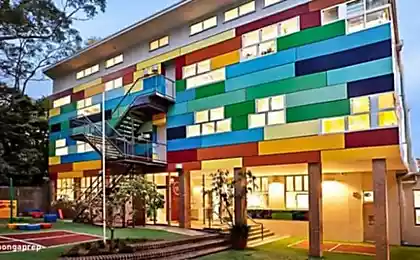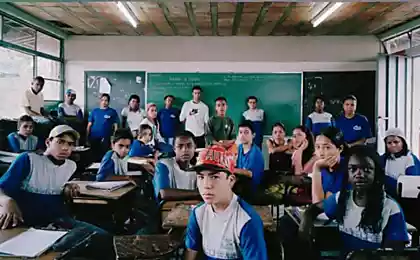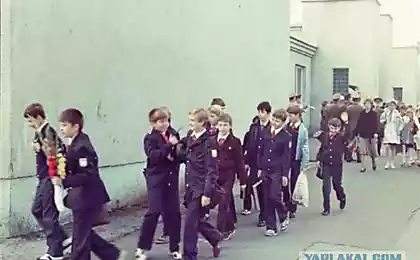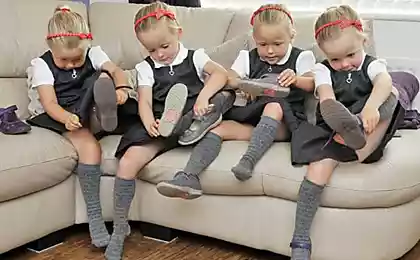744
The mystery of school performance: why some children do well and others do poorly
What factors affect children’s success and failure? From the parents' level of education? No, that's too straightforward. What about then? This mystery was solved by St. Petersburg sociologists.
Are there children who are destined to fail at school? Are there any children who are destined to become excellent students before birth?
Most often, scientists cite the straightforward answer of international experts contained in the materials of the international comparative studies PISA (Programme for International Student Assessment) and TIMSS (Trends in Mathematics and Science Study):Children from families with higher family cultural capital show higher educational outcomes?
But if this is true, why do so many of the children who are bequeathed high cultural capital fail to realize themselves? What is stopping them: teachers’ indifference, overloaded programs, or their own laziness? Or the presence of classmates whose school failures are fatally predetermined by a room in a communal apartment and drinking parents?
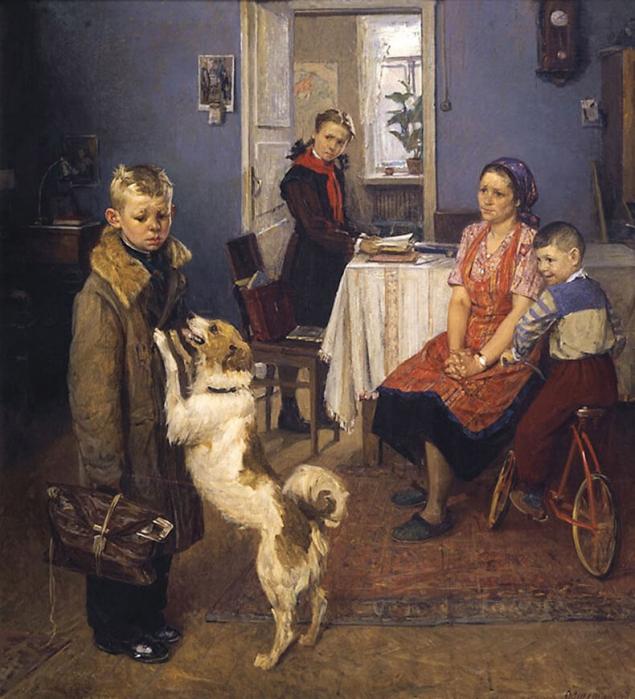
Reshetnikov F. P. “Again two”, 1952
“In fact, many factors that we previously thought were important do not affect children’s academic performance.”Olga Sachava, Candidate of Philological Sciences, Master of Education Management program of the Higher School of Economics (St. Petersburg). And what is really important, we did not pay attention before!
Russia in Miniature
Research on the success and failure of children in the education system is one of the world trends that manifested itself in the 90s, when global reforms of national education systems were unfolding simultaneously in many countries of the world.
Olga Sachava, Candidate of Philological Sciences and head teacher of educational and methodological work at one of the St. Petersburg schools, did not ask new questions, but she managed to find new answers to some of the old questions.
And that's probably because of her school. The school is located on Vasilievsky Island in St. Petersburg. In length, this island is a little more than six kilometers, in width - four kilometers. It is connected with St. Petersburg by four drawbridges. From the end of April to the end of October, during the navigation period on the Neva River, bridges are opened every night.
It is the most densely populated island in Russia. On each square kilometer lives more than 11 thousand inhabitants.
In the early 19th century, the island had a monopoly on all science and education of the capital: the St. Petersburg Academy of Sciences, the library of the Academy of Sciences, the University, the Academy of Arts were located here. And now it is flooded by a wave of unsettled communal apartments. Neighboring rooms facing the common corridor (with a high stucco window of the 19th century) are inhabited by the descendants of indigenous St. Petersburgers and families from the south or extreme north of Russia.
Most of the inhabitants of Vasilievsky Island are migrants. They are looking for a better life for themselves and their children. Others found themselves here as the heroes of the novels of St. Petersburg’s own writers, only because they had nowhere else to go. In their opinion, if you die, it is on Vasilievsky Island. “30 percent of our students are from disadvantaged backgrounds,” teachers tell me.
We don't need to know more about this school. Let’s just say it’s on an island that is Russia in miniature. And Olga Sachava, head teacher and undergraduate student of the Higher School of Economics, really wanted to learn something new about this Russia.
Wealth is useless
Sociological research is a lot of papers and a lot of questions. Most questions (respondents are sure of this, that is, study participants) are not relevant at all. Therefore, these questions are not always answered honestly. But the questionnaires are designed so that sociologists always have the opportunity to check the sincerity of the answers. The questionnaire, which Olga distributed to parents of students of all levels of education (from 2 to 11 grades), included 5 blocks of questions. The four blocks are questions about the family. The fifth is about the child and his performance.
“At first, we hoped to get an answer to the question of whether the material wealth and living conditions of their families affect the school success of children,” says Olga Sachava, “However, we did not find a direct dependence on material wealth.”
“Most of the participants in our survey,” Olga continues, “are residents of St. Petersburg communal houses.” Only 20% of families live in separate apartments. Families of excellent students and tertiary students live in approximately equal proportions in communal apartments and in separate apartments. I had to conclude that the communal apartment does not prevent the child to be successful in school.
It does not affect the performance of children and the presence of a home library in the family. More than 200 books are kept in the families of 73% of the excellent students at home, but 75% of the tertiary families also said that their family library consists of 100 books. Families of 5% of excellent students and 6% of tertiary students owned large libraries (more than 1000 books). It's hard to find an addiction, right?
An important question that worries everyone is: does parental income affect children’s valuations? Can it be argued, as some do, that a child with low family income is simply doomed to receive poor grades?
Our research answers unequivocally: No.
The survey involved low-income families, with incomes for each less than 5000 rubles per month. It was from these families that 26% of all C students and... 30% of all A.D. students came out! There were even more excellent students in low-income families than the Cs.
Incomes of 20% of families of excellent students and 24% of families of tertiary students amounted to 20 000 thousand rubles per person. 25% of excellent students and 21% of tertiary students reported incomes of more than 20,000 rubles for each family member. The proportions are comparable in this case. And we come back to the same mystery. In one case, children from low-income (or, on the contrary, wealthy families) for some reason study on threes, in the other – on fives!
- Have you noticed that high-income families have additional financial opportunities? For example, can they hire tutors for their children?
- Yeah, and they usually do. But most often parents fail to compensate for the lack of family communication contributions to the education of the child (teachers, paid courses, etc.). These contributions just don't work.
The material well-being and even the wealth of the family alone cannot positively influence the school performance of children.
It's different. And now we come to the most interesting.
The first condition, the unexpected - grandmother
A study conducted among families on Vasilievsky Island proved that it is possible to prepare lessons on the kitchen table in a communal room and be an excellent student. You can have a separate room and be a C. It doesn't matter where you live. It matters who.
So, it turned out that 50% of excellent students live in the same apartment with grandparents.
42% of successful children communicate with older relatives, even if they live in another city. In 40% of cases, threes do not meet their grandparents at all. 5% of children with low academic performance reported that they had never seen an older relative.
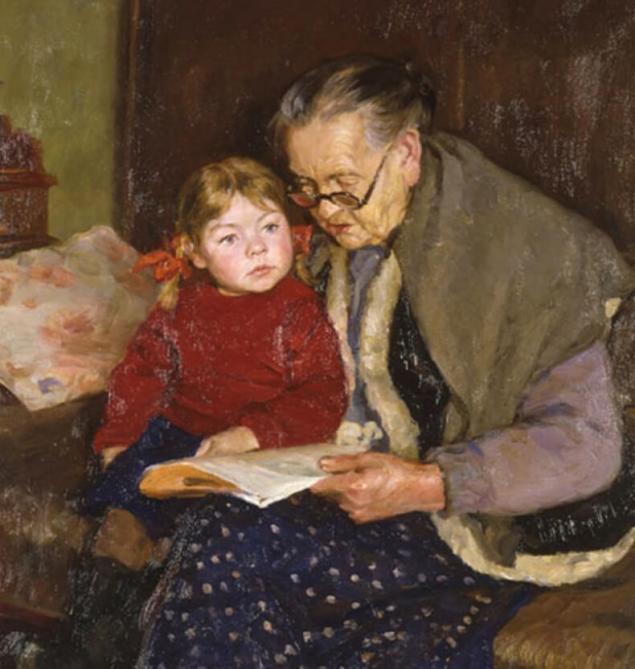
Belov Yu.V. “Grandmother and Granddaughter”, 1958
“This seems surprising only at first glance. The school success of a child at all levels of education is directly influenced by the values of his family, says Olga Sachava. The more important for adults relationships within their family, the more value family life (including relations with older relatives) is for the parents of the student, the more attention parents pay to building family ties, the higher the school grades of their child. Competently built intrafamily ties testify to the psychological competence of parents. They can therefore be described as a key determinant of a child's performance”.
The second condition, even more unexpected, is a family holiday.
- And in this regard, the following example should not seem unusual, continues Olga Sachava. Our study found that 67% of high school and high school students and 73% of high school students live in families where family holidays are always celebrated. But in the families of most tertiary such holidays are celebrated sporadically. Or they don't celebrate at all!
And it is very important that family celebrations are not improvised (gathered, drank, ran away). It is necessary that the family prepares for them in advance: discuss gifts, set the festive table, develop the script of the holiday, sew costumes, send out invitations to relatives and friends, etc.
We found one interesting pattern: the higher the family income and the lower the culture of family holidays, the lower the child’s grades.
And vice versa: the higher the culture of family holidays in relation to family income (average or even low), the higher the student’s academic performance!
- We talked about family celebrations. There is a belief that in almost 100% of cases, two circumstances have a devastating effect on children: the drunkenness of one of the parents and/or their divorce. Does your research confirm that?
- From the very beginning, we wondered whether parental drunkenness affected children's academic performance. This question is simply “on the surface.” But it turned out that the fact of drinking, alone, without a combination of other factors, is not significant for poor performance of the child. Moreover, when parents say, “Yes, there is a problem in our family, and we are working on it,” when moms and dads begin to really do something in this direction, it breaks the negative trend that could affect the student’s academic performance. The negative is compensated by the constructive position of the parents: they have realized the problems existing in family relations, and strive to solve them.
For example, some parents in grades 5-9 reported serious problems in one or more areas of family relationships. We should have thought that their children—according to conventional schemas—did not learn well? Never happened! 90% of these parents have kids at 4 and 5. Why?
It's just that these parents are taking real steps to solve their family problems. We found out by looking at their profiles.
International studies often emphasize that the higher the level of education of parents, the better their child learns. But that's not true either.
For example, 64% of the mothers and fathers of honors students from primary school who participated in our study have a higher education, and in 20% of families of honors students from primary school, one parent has even two higher educations. 68% of C-parents have only secondary education. Is everything right, as in research? Not either.
If in primary school, only every fifth parent of a C-list had a higher education (21%), then in primary school they are twice as many (43%). That is, over time, children of highly educated parents can also become C.
But we should hardly be surprised that 85 percent of all A.D. and B.A. students in the study live in complete families (such as those in which the father and mother are the child’s own). Only 5% of high school students live with their stepmother or stepfather. The situation is the opposite: more than half of them (55%) live in single-parent families!
I want to emphasize that living in a single-parent family does not predetermine low school results. We know even excellent students (10% of the sample), who are brought up in single-parent families. Usually, their mother or father declares that they do not consciously remarry to devote themselves fully to the child.
But most often, a number of consecutive parental mistakes lead to the status of an incomplete family. In some situations, parents did not behave constructively enough. They did not think that their children would pay for it.
Be happy with your life and your children will be great.
- In fact, in your research, you've come to the conclusion that a child's school performance is influenced by parents. But then could you paint me a portrait of the ideal parents? Who can say: their children will (if they have, of course, the ability to learn) to learn “good” and “excellent”?
- If the value of family relationships is important for parents, then the next most important value is professional self-realization. Perhaps this worldview and life position of parents in relation to work, the child perceives as the norm and implements in relation to their own work – educational activities.
According to a study conducted on Vasilievsky Island, 56% of parents of excellent students said that they work primarily for self-realization. They talk not only about moral satisfaction, but also about the pleasure of their professional activities. Only 20% of C-parents said they work for self-realization. Most of them work, in their own words, “for money.”
Another important subjective feature that distinguishes families of excellent and good students from families of C. Strangely enough, this is life satisfaction.
This was reported by 91% of parents of excellent and good students and only 62% of parents of C. I think that many readers may consider this statement either a deception or self-deception.
After all, 30% of the families of excellent and good-natured students participating in the study belong to low-income families. Most of them live in communal apartments.

Bayuskin V. S. “At lunch”, 1950
- The more satisfied parents are with their lives, the more successful their children are in their studies, explains Olga Sachava. - It's a pattern. 23% of C-parents said that they are not completely satisfied with their lives, and 9% said that their own life does not suit them at all. There are no “dissatisfied” parents at all. At all levels of education (from primary to high school), dissatisfied parents tend to be dissatisfied with their child’s learning achievements.
I think any teacher knows this character, the child of dissatisfied parents. His parents always think that the main resource for the development of their children is not their own family, but communication with classmates from families with higher social status.
If there are no such classmates, the family again and again looks for another school for the offspring. But the "child of dissatisfied parents" and in the new school continues to learn unsatisfactory. His problems are not at school or in his classmates. His problems are in the family.
- And yet, I think most readers, when they get to this place, will not believe that the financial situation of the family really means so little to the success of the student. And that the personal happiness parents experience is more important to their children.
- In fact, there are more complex relationships. We came to the conclusion that the performance of schoolchildren correlates not with the objective financial and economic conditions in which the family lives (they, as we have already seen, can be the same for both excellent students and C students), but with the value system of their parents.
Including with the economic competence of parents, with their desire and ability to invest in the future of their family. This competence is expressed in terms of the ratio between the level of income and the quality of the material environment that a family can provide at a given level of income. That is, in the first place again put forward the personality of parents, their relations with loved ones and with the world around them.
Let’s take the average family of an excellent student or a good student from our study. Such a family has an income of 5000-10000 rubles per month per person, a cottage in 62% of cases, a car in 35% of cases (housing issue is not solved in 70%). Parents of students with triples with the same level of income in the family have a cottage only in 36% of cases, and a car in 27%. (housing issue is not solved in 90% of cases).
But the most interesting thing is that even with higher incomes (exceeding 20,000 rubles per month per person), parents of C-lists still can not buy a cottage or a car. This means, first of all, the economic incompetence of these families, their inability to manage family finances.
Therefore, in families with a relatively low income, but a higher level of the subject environment (apartment, car, cottage), children show higher educational results than in those families where the income level is relatively high, but the quality of the subject environment is lower.
A must read for parents!
Becoming a Feminine: Let the Girl Be a Princess!
The research we are talking about formed the basis of your master’s thesis, written at the Higher School of Economics (St. Petersburg). Each dissertation has a “conclusions” section. What conclusions would you draw?
- I think we school teachers have made and are making the mistake of investing only in computers, books, teaching equipment for school and for families. We hoped that these investments would improve the performance of children. In fact, we need to invest in targeted interaction with families, in the formation of parents and children of the necessary values and competencies. But how to do that, I don’t know yet. Let's think together.published
Author: Svetlana Kirillova
P.S. And remember, just by changing your consciousness – together we change the world!
Source: www.miloserdie.ru/article/tajna-shkolnoj-uspevaemosti-pochemu-odni-deti-uchatsya-horosho-a-drugie-ploho/
Are there children who are destined to fail at school? Are there any children who are destined to become excellent students before birth?
Most often, scientists cite the straightforward answer of international experts contained in the materials of the international comparative studies PISA (Programme for International Student Assessment) and TIMSS (Trends in Mathematics and Science Study):Children from families with higher family cultural capital show higher educational outcomes?
But if this is true, why do so many of the children who are bequeathed high cultural capital fail to realize themselves? What is stopping them: teachers’ indifference, overloaded programs, or their own laziness? Or the presence of classmates whose school failures are fatally predetermined by a room in a communal apartment and drinking parents?

Reshetnikov F. P. “Again two”, 1952
“In fact, many factors that we previously thought were important do not affect children’s academic performance.”Olga Sachava, Candidate of Philological Sciences, Master of Education Management program of the Higher School of Economics (St. Petersburg). And what is really important, we did not pay attention before!
Russia in Miniature
Research on the success and failure of children in the education system is one of the world trends that manifested itself in the 90s, when global reforms of national education systems were unfolding simultaneously in many countries of the world.
Olga Sachava, Candidate of Philological Sciences and head teacher of educational and methodological work at one of the St. Petersburg schools, did not ask new questions, but she managed to find new answers to some of the old questions.
And that's probably because of her school. The school is located on Vasilievsky Island in St. Petersburg. In length, this island is a little more than six kilometers, in width - four kilometers. It is connected with St. Petersburg by four drawbridges. From the end of April to the end of October, during the navigation period on the Neva River, bridges are opened every night.
It is the most densely populated island in Russia. On each square kilometer lives more than 11 thousand inhabitants.
In the early 19th century, the island had a monopoly on all science and education of the capital: the St. Petersburg Academy of Sciences, the library of the Academy of Sciences, the University, the Academy of Arts were located here. And now it is flooded by a wave of unsettled communal apartments. Neighboring rooms facing the common corridor (with a high stucco window of the 19th century) are inhabited by the descendants of indigenous St. Petersburgers and families from the south or extreme north of Russia.
Most of the inhabitants of Vasilievsky Island are migrants. They are looking for a better life for themselves and their children. Others found themselves here as the heroes of the novels of St. Petersburg’s own writers, only because they had nowhere else to go. In their opinion, if you die, it is on Vasilievsky Island. “30 percent of our students are from disadvantaged backgrounds,” teachers tell me.
We don't need to know more about this school. Let’s just say it’s on an island that is Russia in miniature. And Olga Sachava, head teacher and undergraduate student of the Higher School of Economics, really wanted to learn something new about this Russia.
Wealth is useless
Sociological research is a lot of papers and a lot of questions. Most questions (respondents are sure of this, that is, study participants) are not relevant at all. Therefore, these questions are not always answered honestly. But the questionnaires are designed so that sociologists always have the opportunity to check the sincerity of the answers. The questionnaire, which Olga distributed to parents of students of all levels of education (from 2 to 11 grades), included 5 blocks of questions. The four blocks are questions about the family. The fifth is about the child and his performance.
“At first, we hoped to get an answer to the question of whether the material wealth and living conditions of their families affect the school success of children,” says Olga Sachava, “However, we did not find a direct dependence on material wealth.”
“Most of the participants in our survey,” Olga continues, “are residents of St. Petersburg communal houses.” Only 20% of families live in separate apartments. Families of excellent students and tertiary students live in approximately equal proportions in communal apartments and in separate apartments. I had to conclude that the communal apartment does not prevent the child to be successful in school.
It does not affect the performance of children and the presence of a home library in the family. More than 200 books are kept in the families of 73% of the excellent students at home, but 75% of the tertiary families also said that their family library consists of 100 books. Families of 5% of excellent students and 6% of tertiary students owned large libraries (more than 1000 books). It's hard to find an addiction, right?
An important question that worries everyone is: does parental income affect children’s valuations? Can it be argued, as some do, that a child with low family income is simply doomed to receive poor grades?
Our research answers unequivocally: No.
The survey involved low-income families, with incomes for each less than 5000 rubles per month. It was from these families that 26% of all C students and... 30% of all A.D. students came out! There were even more excellent students in low-income families than the Cs.
Incomes of 20% of families of excellent students and 24% of families of tertiary students amounted to 20 000 thousand rubles per person. 25% of excellent students and 21% of tertiary students reported incomes of more than 20,000 rubles for each family member. The proportions are comparable in this case. And we come back to the same mystery. In one case, children from low-income (or, on the contrary, wealthy families) for some reason study on threes, in the other – on fives!
- Have you noticed that high-income families have additional financial opportunities? For example, can they hire tutors for their children?
- Yeah, and they usually do. But most often parents fail to compensate for the lack of family communication contributions to the education of the child (teachers, paid courses, etc.). These contributions just don't work.
The material well-being and even the wealth of the family alone cannot positively influence the school performance of children.
It's different. And now we come to the most interesting.
The first condition, the unexpected - grandmother
A study conducted among families on Vasilievsky Island proved that it is possible to prepare lessons on the kitchen table in a communal room and be an excellent student. You can have a separate room and be a C. It doesn't matter where you live. It matters who.
So, it turned out that 50% of excellent students live in the same apartment with grandparents.
42% of successful children communicate with older relatives, even if they live in another city. In 40% of cases, threes do not meet their grandparents at all. 5% of children with low academic performance reported that they had never seen an older relative.

Belov Yu.V. “Grandmother and Granddaughter”, 1958
“This seems surprising only at first glance. The school success of a child at all levels of education is directly influenced by the values of his family, says Olga Sachava. The more important for adults relationships within their family, the more value family life (including relations with older relatives) is for the parents of the student, the more attention parents pay to building family ties, the higher the school grades of their child. Competently built intrafamily ties testify to the psychological competence of parents. They can therefore be described as a key determinant of a child's performance”.
The second condition, even more unexpected, is a family holiday.
- And in this regard, the following example should not seem unusual, continues Olga Sachava. Our study found that 67% of high school and high school students and 73% of high school students live in families where family holidays are always celebrated. But in the families of most tertiary such holidays are celebrated sporadically. Or they don't celebrate at all!
And it is very important that family celebrations are not improvised (gathered, drank, ran away). It is necessary that the family prepares for them in advance: discuss gifts, set the festive table, develop the script of the holiday, sew costumes, send out invitations to relatives and friends, etc.
We found one interesting pattern: the higher the family income and the lower the culture of family holidays, the lower the child’s grades.
And vice versa: the higher the culture of family holidays in relation to family income (average or even low), the higher the student’s academic performance!
- We talked about family celebrations. There is a belief that in almost 100% of cases, two circumstances have a devastating effect on children: the drunkenness of one of the parents and/or their divorce. Does your research confirm that?
- From the very beginning, we wondered whether parental drunkenness affected children's academic performance. This question is simply “on the surface.” But it turned out that the fact of drinking, alone, without a combination of other factors, is not significant for poor performance of the child. Moreover, when parents say, “Yes, there is a problem in our family, and we are working on it,” when moms and dads begin to really do something in this direction, it breaks the negative trend that could affect the student’s academic performance. The negative is compensated by the constructive position of the parents: they have realized the problems existing in family relations, and strive to solve them.
For example, some parents in grades 5-9 reported serious problems in one or more areas of family relationships. We should have thought that their children—according to conventional schemas—did not learn well? Never happened! 90% of these parents have kids at 4 and 5. Why?
It's just that these parents are taking real steps to solve their family problems. We found out by looking at their profiles.
International studies often emphasize that the higher the level of education of parents, the better their child learns. But that's not true either.
For example, 64% of the mothers and fathers of honors students from primary school who participated in our study have a higher education, and in 20% of families of honors students from primary school, one parent has even two higher educations. 68% of C-parents have only secondary education. Is everything right, as in research? Not either.
If in primary school, only every fifth parent of a C-list had a higher education (21%), then in primary school they are twice as many (43%). That is, over time, children of highly educated parents can also become C.
But we should hardly be surprised that 85 percent of all A.D. and B.A. students in the study live in complete families (such as those in which the father and mother are the child’s own). Only 5% of high school students live with their stepmother or stepfather. The situation is the opposite: more than half of them (55%) live in single-parent families!
I want to emphasize that living in a single-parent family does not predetermine low school results. We know even excellent students (10% of the sample), who are brought up in single-parent families. Usually, their mother or father declares that they do not consciously remarry to devote themselves fully to the child.
But most often, a number of consecutive parental mistakes lead to the status of an incomplete family. In some situations, parents did not behave constructively enough. They did not think that their children would pay for it.
Be happy with your life and your children will be great.
- In fact, in your research, you've come to the conclusion that a child's school performance is influenced by parents. But then could you paint me a portrait of the ideal parents? Who can say: their children will (if they have, of course, the ability to learn) to learn “good” and “excellent”?
- If the value of family relationships is important for parents, then the next most important value is professional self-realization. Perhaps this worldview and life position of parents in relation to work, the child perceives as the norm and implements in relation to their own work – educational activities.
According to a study conducted on Vasilievsky Island, 56% of parents of excellent students said that they work primarily for self-realization. They talk not only about moral satisfaction, but also about the pleasure of their professional activities. Only 20% of C-parents said they work for self-realization. Most of them work, in their own words, “for money.”
Another important subjective feature that distinguishes families of excellent and good students from families of C. Strangely enough, this is life satisfaction.
This was reported by 91% of parents of excellent and good students and only 62% of parents of C. I think that many readers may consider this statement either a deception or self-deception.
After all, 30% of the families of excellent and good-natured students participating in the study belong to low-income families. Most of them live in communal apartments.

Bayuskin V. S. “At lunch”, 1950
- The more satisfied parents are with their lives, the more successful their children are in their studies, explains Olga Sachava. - It's a pattern. 23% of C-parents said that they are not completely satisfied with their lives, and 9% said that their own life does not suit them at all. There are no “dissatisfied” parents at all. At all levels of education (from primary to high school), dissatisfied parents tend to be dissatisfied with their child’s learning achievements.
I think any teacher knows this character, the child of dissatisfied parents. His parents always think that the main resource for the development of their children is not their own family, but communication with classmates from families with higher social status.
If there are no such classmates, the family again and again looks for another school for the offspring. But the "child of dissatisfied parents" and in the new school continues to learn unsatisfactory. His problems are not at school or in his classmates. His problems are in the family.
- And yet, I think most readers, when they get to this place, will not believe that the financial situation of the family really means so little to the success of the student. And that the personal happiness parents experience is more important to their children.
- In fact, there are more complex relationships. We came to the conclusion that the performance of schoolchildren correlates not with the objective financial and economic conditions in which the family lives (they, as we have already seen, can be the same for both excellent students and C students), but with the value system of their parents.
Including with the economic competence of parents, with their desire and ability to invest in the future of their family. This competence is expressed in terms of the ratio between the level of income and the quality of the material environment that a family can provide at a given level of income. That is, in the first place again put forward the personality of parents, their relations with loved ones and with the world around them.
Let’s take the average family of an excellent student or a good student from our study. Such a family has an income of 5000-10000 rubles per month per person, a cottage in 62% of cases, a car in 35% of cases (housing issue is not solved in 70%). Parents of students with triples with the same level of income in the family have a cottage only in 36% of cases, and a car in 27%. (housing issue is not solved in 90% of cases).
But the most interesting thing is that even with higher incomes (exceeding 20,000 rubles per month per person), parents of C-lists still can not buy a cottage or a car. This means, first of all, the economic incompetence of these families, their inability to manage family finances.
Therefore, in families with a relatively low income, but a higher level of the subject environment (apartment, car, cottage), children show higher educational results than in those families where the income level is relatively high, but the quality of the subject environment is lower.
A must read for parents!
Becoming a Feminine: Let the Girl Be a Princess!
The research we are talking about formed the basis of your master’s thesis, written at the Higher School of Economics (St. Petersburg). Each dissertation has a “conclusions” section. What conclusions would you draw?
- I think we school teachers have made and are making the mistake of investing only in computers, books, teaching equipment for school and for families. We hoped that these investments would improve the performance of children. In fact, we need to invest in targeted interaction with families, in the formation of parents and children of the necessary values and competencies. But how to do that, I don’t know yet. Let's think together.published
Author: Svetlana Kirillova
P.S. And remember, just by changing your consciousness – together we change the world!
Source: www.miloserdie.ru/article/tajna-shkolnoj-uspevaemosti-pochemu-odni-deti-uchatsya-horosho-a-drugie-ploho/
10 ideas for short trips from Prague
Mount Kailash – the heart of the world, the earth's axis and the center of the Universe



